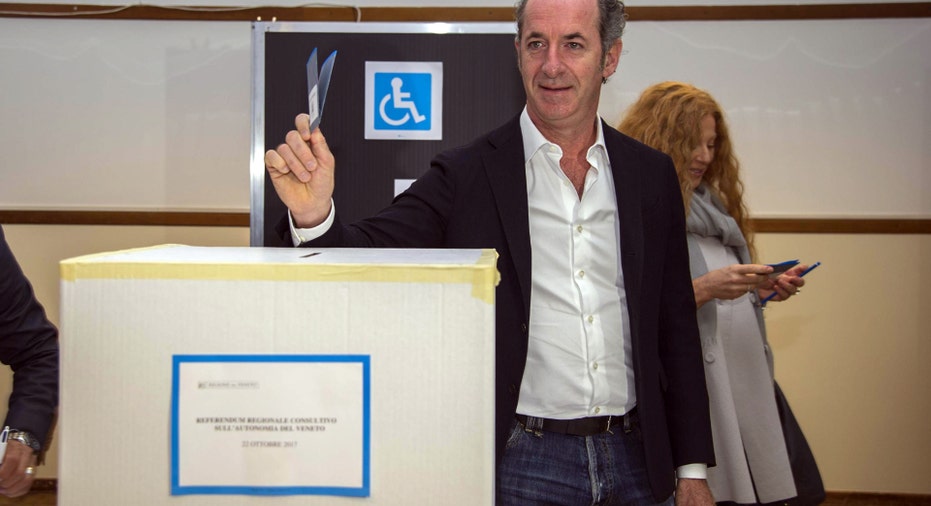Italy's 2 richest regions seek more powers from Rome

MILAN (AP) — Voters in the wealthy northern Italian regions of Lombardy and Veneto were deciding Sunday if they want to seek greater autonomy from Rome, riding a tide of self-determination that is sweeping global politics.
While the twin referendums are non-binding, a resounding "yes" vote would give the presidents of the neighboring regions more leverage in negotiations to seek a greater share of tax revenue and to grab more responsibility from Italy's central government. The leaders want more powers in areas such as security, immigration, education and the environment.
Even though the referendums — which were approved by Italy's constitutional court — don't seek independence, the autonomy drive is a powerful threat to Rome's authority. Together, Veneto and Lombardy account for 30 percent of Italy's GDP and nearly one-quarter of the nation's electorate.
At their respective polling places, Lombardy President Roberto Maroni and Veneto President Luca Zaia cast the referendum as a historic opportunity.
"A page of history is being written," Zaia said as he voted in Treviso province, north of Venice. "Veneto will not be the same as before."
Maroni, speaking as he voted in Varese province north of Milan, said the referendum represented "a historic occasion" for the two leaders to seek "greater responsibilities and resources."
Maroni said he would be happy if 34 percent of the region's 7.5 million voters cast ballots, equal to the national turnout in a 2001 constitutional referendum. Veneto's aspirations will wither if voter turnout is below 50 percent plus one of the region's 3.5 million voters.
By noon, just 6 percent of Lombard voters had cast ballots while Veneto turnout was 21 percent, according to the Italian news agency ANSA. Lombardy officials put the midday turnout at 10 percent. The reason for the discrepancy was not immediately clear.
Critically, some of the key areas where the two northern regions want more autonomy — including greater fiscal control, immigration and security issues — are beyond the scope defined by the constitution, thereby requiring difficult-to-achieve constitutional changes.
"I don't think this is possible," said Paolo Natale, a political scientist at Milan's state university. "It will be difficult for the state to accept that they take over education and security policy. The management of immigration policy has to be done at a national level."
Other policy areas where autonomy is easier to win — including environmental and cultural protection — have not been on the front lines of the referendum campaign.
Both regions are run by the anti-migrant, anti-Europe Northern League, which has long given up its founding goal of secession as it seeks a national profile. Also supporting the referendum is former Premier Silvio Berlusconi's Forza Italia and the populist 5-Star Movement.
With the Democratic Party urging its voters to abstain, the votes Sunday will measure the mood ahead of a national election next year, when Berlusconi says he will make autonomy for all of Italy's regions part of the center-right agenda.
Critics argue the non-binding votes carry no legal weight, are not needed to trigger autonomy negotiations and are a costly waste of resources.
Yet such arguments play into the hands of the "yes" campaigners, who see such put-downs as part of the anti-democratic, centrist decision-making in Rome. Those sentiments have been echoed in the Catalan independence drive in Spain, in the U.S. election of Donald Trump as president and in Britain's vote to leave the 28-nation European Union.
The Italian constitution already grants varying levels of autonomy to five regions in recognition of their special status: the largely German-speaking Trentino-Alto Adige; the French-speaking Aosta; the islands of Sardinia and Sicily; and the region of Friuli-Venezia Giulia for its position on the border with then-Yugoslavia as a Cold War hedge.
Veneto was twice denied by the constitutional court requests for referendums for fiscal autonomy before a 2001 constitutional change defined the policy areas for which Italy's 15 ordinary regions can seek autonomy.
The ballots Sunday are the first to pose the question to voters. Emilia Romagna, a center-left region, has recently opened talks with Rome on greater autonomy without holding a popular vote.



















